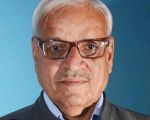The title of “historian” carries a profound weight, imbued with the responsibility to uncover, interpret, and present the past with rigor, objectivity, and intellectual honesty. Historians are entrusted with shaping collective memory, informing public discourse, and providing insights that withstand scrutiny. However, when individuals like Ashok Kumar Pandey, who proclaim themselves historians, engage in activities that blur the lines between scholarship and political advocacy, it raises critical questions about the integrity of the profession. This article examines whether calling Pandey a historian undermines the discipline’s sanctity, particularly in light of his self-promotion, political affiliations, and public conduct.
The Role and Responsibility of a Historian
Historians are not mere storytellers; they are scholars who navigate complex archives, primary sources, and competing narratives to construct evidence-based accounts of the past. Their work demands methodological precision, critical analysis, and a commitment to minimizing bias. As Eric Hobsbawm noted, historians must “seek the truth, however inconvenient,” resisting the temptation to serve ideological agendas. This responsibility is amplified in polarized societies, where historical narratives are often weaponized to justify political positions.
A historian’s credibility hinges on their ability to maintain intellectual independence. While personal beliefs inevitably shape perspectives, the discipline requires transparency about sources, acknowledgment of uncertainties, and openness to critique. When historians align overtly with political entities or prioritize self-promotion over scholarship, they risk eroding public trust in the profession. This brings us to the case of Ashok Kumar Pandey, whose self-identification as a historian invites scrutiny.
Ashok Kumar Pandey: Background and Self-Proclaimed Historicity
Ashok Kumar Pandey, born in 1975 in Uttar Pradesh, is an author, poet, and commentator known for works like Kashmirnama, Kashmir aur Kashmiri Pandit, and Usne Gandhi ko Kyon Mara. With an MA in Economics from Gorakhpur University, Pandey lacks formal training in history, a point that does not inherently disqualify him but raises questions about his methodological grounding. His books, while popular in Hindi literary circles, have been criticized for selective narration, particularly in their treatment of sensitive topics like the Kashmiri Pandit exodus. For instance, his critique of The Kashmir Files as a “propaganda film” emphasizes the persecution of Muslims while downplaying the Pandit experience, a choice that aligns with certain political narratives.
Pandey’s public persona extends beyond authorship. As the managing editor of The Credible History, a platform claiming to offer “authentic” historical accounts, he positions himself as a public intellectual. His YouTube channel and social media presence amplify this image, blending historical commentary with contemporary political critique. However, his frequent public appearances with Congress leaders and his vocal support for their positions have fueled accusations of partisanship. A post on X described him as a “wretched radical ideologue masquerading as a neutral historian,” reflecting a sentiment that his political engagements undermine his scholarly claims.
The Charge of Brokerage: Political Affiliations and Historical Integrity
The term “brokerage” implies acting as an intermediary for personal or political gain, a charge leveled against Pandey due to his visible association with Congress leaders. Photographs of him “holding court” with politicians, shared on social media, create a perception of alignment rather than independence. While historians are not barred from political engagement, such overt affiliations risk compromising their objectivity. When Pandey critiques right-wing narratives—such as those surrounding Nathuram Godse or the Kashmir issue—his arguments are often framed in ways that echo Congress’s secular rhetoric, raising questions about whether his historical interpretations serve a political agenda.
This perception is compounded by Pandey’s self-promotion as a historian. Unlike trained historians who undergo peer review and academic scrutiny, Pandey’s credentials rest largely on his publications and media presence. His books, while commercially successful, are not universally regarded as rigorous historical works. Critics argue that his Marxist leanings, openly acknowledged in interviews, color his analyses, leading to selective portrayals that prioritize ideological consistency over balanced inquiry. For example, his dismissal of The Kashmir Files as “mostly inaccurate” focuses on its right-wing bias but sidesteps similar critiques of left-leaning narratives, a double standard that weakens his scholarly credibility.
The Mockery of Historical Responsibility
Calling Pandey a historian risks making a mockery of the profession when his conduct prioritizes publicity and political alignment over scholarly rigor. Historians bear the burden of presenting evidence that withstands cross-examination, yet Pandey’s work often leans on emotive storytelling rather than exhaustive research. His engagement with complex issues like the Gandhi assassination or Kashmiri Pandit displacement tends to simplify narratives in ways that align with his ideological stance, a practice that contravenes the historian’s duty to embrace complexity.
Moreover, his public behavior—sharing images with political figures and framing himself as a spokesperson for “credible history”—suggests a performative approach to the role. True historians derive authority from their work’s quality, not from media visibility or political endorsements. Pandey’s blending of poetry, activism, and history further muddies the waters, as it conflates creative expression with the disciplined inquiry history demands. This blurring of roles diminishes the profession’s gravitas, inviting skepticism about whether self-proclaimed historians respect the responsibility their title entails.
Counterarguments: The Democratization of History
To be fair, Pandey’s defenders might argue that history should not be confined to academic elites. His accessible writing and media presence democratize historical knowledge, reaching audiences beyond scholarly circles. In a country where Hindi-language scholarship is often undervalued, Pandey’s contributions fill a gap, offering narratives that challenge dominant right-wing interpretations. His focus on marginalized voices, such as Kashmiri Muslims or Gandhi’s legacy, could be seen as a corrective to majoritarian biases.
The Broader Implications
The case of Ashok Kumar Pandey underscores a larger crisis in historical scholarship: the tension between accessibility and rigor, activism and objectivity. In an era of social media and polarized discourse, self-proclaimed historians can amass influence without the checks of academic peer review. While this democratizes knowledge, it also risks diluting the discipline’s standards. When individuals like Pandey prioritize political alignment and self-promotion, they contribute to a culture where history becomes a tool for advocacy rather than truth-seeking.
This is not to say Pandey’s work lacks value. His books spark debate and engage lay readers, a commendable achievement. However, the title of historian demands more than popularity—it requires a commitment to evidence, nuance, and intellectual independence. By intertwining his historical claims with political brokerage, Pandey undermines the very responsibility he claims to uphold.
Labeling Ashok Kumar Pandey a historian does not inherently mock the profession, but his conduct—marked by self-promotion, selective narration, and political affiliations—raises legitimate concerns. Historians must navigate the past with humility and rigor, resisting the allure of ideology or fame. While Pandey’s contributions to public discourse are notable, his approach often prioritizes advocacy over scholarship, inviting accusations of brokerage. The responsibility of being a historian is too profound to be claimed lightly; it demands a dedication to truth that transcends personal or political agendas. Until Pandey aligns his work more closely with these principles, his claim to the title will remain contentious, serving as a cautionary tale for the discipline.





